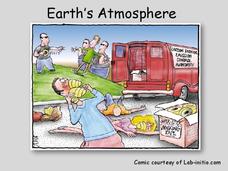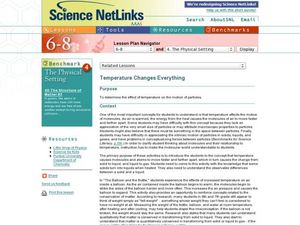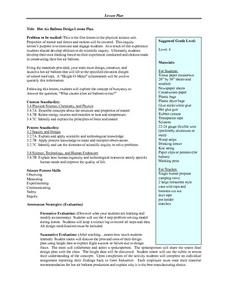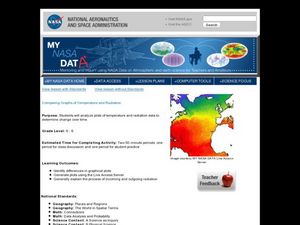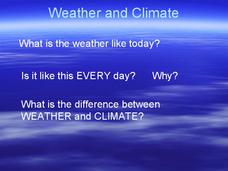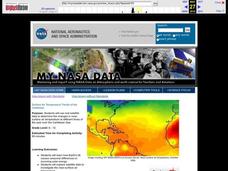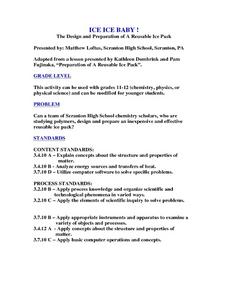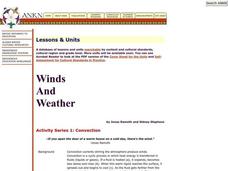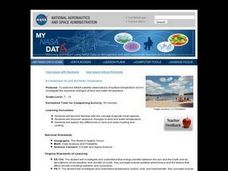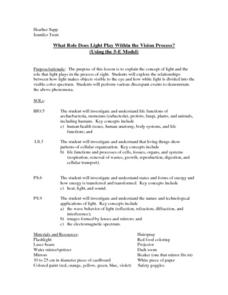Science Geek
Earth's Atmosphere
Ozone gas absorbs the harmful UV-B rays and helps protect humans. An informative presentation begins with the layers of the earth's atmosphere, the pressure and temperature in each of the layers, the ozone layer, the ozone cycle, and the...
Curated OER
Wavelengths of Light
Explore physical science by participating in a visual spectrum experiments. Budding scientists identify the colors in the color spectrum and view the colors in class by utilizing cellophane, flash lights, and other arts and crafts...
Curated OER
Temperature Changes Everything
Learners determine the effect of temperature on the motion of particles. They study the difference between particles in a gas, liquid, and a solid and see how the characteristics of solids, liquids, and gases can be explained by particle...
Curated OER
Water and Ice
Students experiment with water and ice. In this states of matter instructional activity, students explore how water can change from a solid to a liquid and back again. They discuss and write about the results of the experiment in a...
Curated OER
Water and Ice
Students investigate how water changes state. In this water lesson, students observe, measure, and describe water as it changes state. This lesson includes extensions which can be accessed via the provided web links.
Curated OER
Wonders of Weather
Students understand the destructive force of a tornado. They learn the role of a thunderstorm in the creation of a tornado.
Curated OER
Understanding Climate
Fourth graders create two dioramas out of household materials to compare the influence of various factors that impact climate. Each group discuss how the change in factors influenced the climate, flora, and fauna of their area.
Curated OER
Atmospheric Processes - Conduction
Students explain the process of conduction using a molecular explanation, and explain how different materials conduct at different rates.
Curated OER
Hot Air Balloon Design Lesson Plan
Sixth graders discuss what they know and what they want to know about hot air balloon using a KWL chart. They then use a wide array of materials to design a hot air balloon that will lift successfully in cooperative groups referring to...
Curated OER
Design a Bobsled
Students apply their knowledge of friction, drag, mass and gravity as they design, build, and test mini-bobsleds.
Discovery Education
Cushion It!
Sugar cubes, collide! Groups design protection systems using bubble wrap to protect sugar cubes from being destroyed by falling batteries in the STEM lesson. They consider how the experiment relates to collisions in real-world...
Curated OER
Comparing Graphs of Temperature and Radiation
Middle schoolers study plots and use a Live Access Server to generate plots. In this temperature lesson students examine the process of incoming and outgoing radiation.
Curated OER
Weather and Climate
It's hot today, but is that the weather or the climate? This colorful presentation isolates both concepts to allow for better understanding by covering the positioning of the planet, making comparisons of land versus water, and looking...
K12 Reader
Convection Currents
After reading a brief article on the connection between convection currents and winds, kids use information in the text to respond to a series of comprehension questions.
University of Colorado
Great Red Spot Pinwheel
The great red spot on Jupiter is 12,400 miles long and 7,500 miles wide. In this sixth part of a 22-part series, individuals model the rotation of the Great Red Spot on Jupiter. To round out the activity, they discuss their findings as a...
Curated OER
Climate and Topography, What Is the Connection?
Fourth graders study Neumann's world continent map and explore topography and climate.
Curated OER
Classification of Clouds
Students view progressive slides of cloud formations and identify which type of cloud is shown as it forms. They estimate the cloud's height while viewing each image.
Curated OER
Surface Air Temperature Trends of the Caribbean
Students investigate the seasonal changes to sea surface and near-surface air temperatures near the equator. They use actual satellite data to track and graph the differences in air and sea temperatures during different seasons in the...
Curated OER
Ice Ice Baby! The Design and Preparation of A Reusable Ice Pack
Students explore polymers by designing and preparing an inexpensive and effective reusable ice pack. They develop and test a design for a reusable ice pack in the science lab. Students apply chemical and physical properties of polymers...
Curated OER
Convection
Students experiment with the cyclic process of convection and apply the principal to everyday events.
Curated OER
A Comparison of Land and Water Temperature
Students examine NASA satellite observations of surface temperature and investigate the seasonal changes of land and water temperature.
Curated OER
The Magma Also Rises
Convection is thoroughly demonstrated using a model of Earth's mantle. Detailed background information is provided for the teacher, as well as a list of materials. Although a colorful and detailed worksheet is available for the class,...
Curated OER
What Role Does Light Play Within the Vision Process?
Students are introduced to the relationship between light and vision. In groups, they participate in experiments to discover how different wavelengths are divided in the visible spectrum. They record their answers and discuss their...
Curated OER
Plate Tectonics
Students research separate elements of the theory of Plate Tectonics, then share that information with each other, drawing conclusions from the culminated information.


